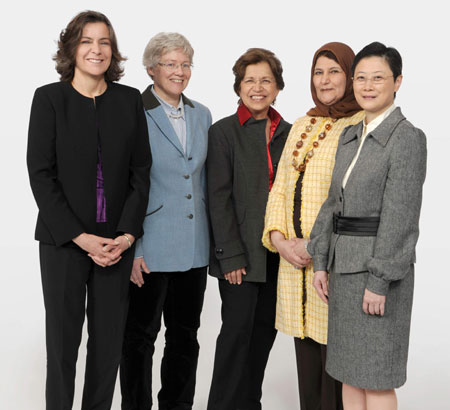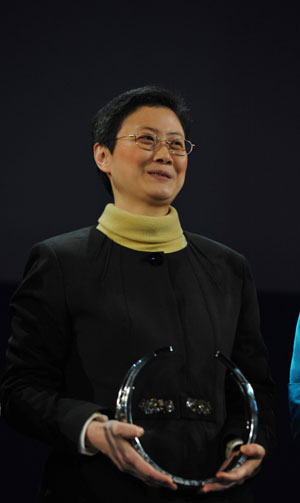Life
Wife, mother and scientist
Updated: 2011-03-08 07:56
By Wang Ru (China Daily)
|
 Five women scientists receive the 2011 L'Oreal-UNESCO For Women in Science Awards at a ceremony on March 3, at UNESCO Headquarters in Paris. Photos provided to China Daily |
A winner of the 2011 L'Oreal-UNESCO For Women in Science Awards, Professor Vivian Wing-wah Yam says she could not have done it without the backing of her family. Wang Ru reports.
|
 Professor Vivian Wing-wah Yam at the awards ceremony in Paris. |
The road to scientific discovery is tougher for women than for men and Professor Vivian Wing-wah Yam says she couldn't have succeeded without such a supportive family. The 47-year-old from Hong Kong University was one of five women scientists, from each continent, to receive the 2011 L'Oreal-UNESCO For Women in Science Awards at a ceremony on March 3, at UNESCO Headquarters in Paris. It is the 13th edition of the award since 1998.
Selected by a 15-member jury, presided over by Ahmed Zewail, who received the Nobel Prize in Chemistry 1999, each laureate will receive $100,000.
Yam's long and fruitful research on solving the energy problem won her the prize for Asia and the Pacific.
There are several renewable and sustainable energy solutions, like solar power, which could provide an unlimited source of energy. Some problems must be resolved, however, such as the low efficiency of solar cells and their high supply costs.
Yam and her colleagues hope to overcome these problems by developing and testing new photoactive materials.
She became the third Chinese women scientist honored with the so-called "woman's Nobel Prize" award, after Professor Li Fanghua from the Chinese Academy of Sciences in 2003, and Professor Ye Ruyu from Hong Kong University of Science and Technology in 2004.
"
 |
For Yam, chemistry is science, but also an art. Amazed by the universe, nature and color in her childhood, Yam decided on a career in chemistry.
"One of the beauties of chemistry is the ability to create new molecules and chemical species. I have always associated chemists with artists, creating new things with innovative ideas," Yam said.
As a mother of two daughters, 12 and 14, Yam said she is lucky to have been supported by her family. She was inspired as a child by her father, a professor in the Civil Engineering Faculty at Hong Kong University.
Yam added her husband, Mak Shingtat, a PhD in chemistry, who accompanied Yam to the awards ceremony, was also fully supportive of her work.
"I can't imagine how my career could move on without his understanding and support," she said. "I often stay late at night in the laboratory. He always waits for me outside."
Yam received her bachelor and PhD degrees from the University of Hong Kong (HKU). She taught at City Polytechnic of Hong Kong before joining HKU as a faculty member, and headed the chemistry department for two terms from 2000 to 2005.
At 38, she was the youngest member elected to the Chinese Academy of Sciences. She is also a Fellow of TWAS, the Academy of Sciences for the Developing World, and was awarded the State Natural Science Award and the Royal Society of Chemistry (RSC) Centenary Medal.
2011 is the 100th anniversary of Marie Curie's second Nobel Prize, coinciding with the International Year of Chemistry. Today, Curie is still a role model for women in science.
Although the participation of women in science, is promoted by UNESCO, notably through L'Oreal-UNESCO, there are still too few women doing high-level science, says UNESCO Director-General Irina Bokova.
The latest UNESCO report shows less than 40 percent of countries provide girls and boys equal access to education
Two out of three countries have gender disparities in their primary and secondary education systems, and as many as half will not achieve the goal of gender parity in education by 2015, according to the report by the UNESCO Institute for Statistics (UIS).
Despite the improved access to tertiary education, women face considerable barriers as they move up the education ladder to research careers.
At the bachelor's degree level, most countries' reporting data show they have achieved gender parity in terms of graduates. Women are more likely to pursue the next level of education, accounting for 56 percent of graduates with master's degrees.
However, men surpass women in virtually all countries at the highest levels of education, accounting for 56 percent of all PhD graduates and 71 percent of researchers.
According to the UIS study, women represent less than 30 percent of the researchers in the world, a figure that hides numerous regional disparities.
Although the number of researchers working in developing countries over the past five years has increased by 50 percent, women occupy a small percentage of these positions in some regions, the UNESCO report says.
Each year, the L'Oreal-UNESCO For Women in Science Award recognizes 15 young women from all over the world, especially developing countries, to encourage and finance their studies. More than 200 young women scientists are currently supported.
In recent decades, China has contributed the major share of the increase of female scientists in Asia. By 2009, there were 14.37 million women working in science and technology fields, taking up 33 percent of the total. Among the 45,000 research students at the China Academy of Science (CAS), 32.3 percent are women
"Social discrimination against women scientists widely exists in China," said Lu Yongxiang, president of CAS, at the fourth convention of The Third World Organization For Women in Sciences held in China last year. "Women scientists need more equal opportunities and support."
"I do not think there is a difference between men and women in terms of their intellectual abilities and research capabilities," Yam said. "As long as one has the passion, dedication and determination to pursue research wholeheartedly, one can excel regardless of one's gender or background."
Yam said some young women, who require stability and security, often have to give up their research because of family pressures.
"The only way for women to succeed in science is to get the mental and material support from family and society. There is a day-care center at my university, and my husband and mother-in-law help a lot with the housework, so I am able to spend my time on research," she said.
"I have two young daughters, and it is too early to tell whether or not they want to pursue careers in science. But, I will encourage them to always defend their ideas. To remain determined, and to never be afraid of failure - this is the advice that they will need to succeed in realizing their dreams."
Yam also acknowledged her colleague's support, at the awards ceremony.
"This (award) not only recognizes me, but my colleagues and students and my country, China."
Specials

NPC & CPPCC sessions
Lawmakers and political advisers gather in Beijing to discuss major issues.

Self-made aircraft
An automobile mechanic in Northeast China made a test flight of his self-made aircraft which cost about US$395.

Venetian Carnival
Masked revellers celebrate in Saint Mark's Square in Venice.